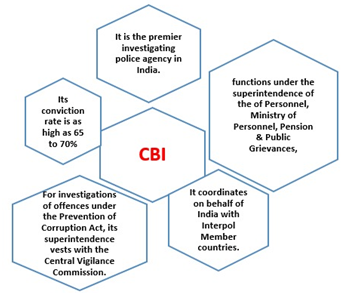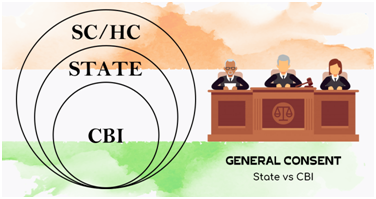CBI


CBI
Current Affairs Daily News & Issues
La Excellence IAS Academy | November 10, 2023
CBI
Context: West Bengal sued the Central government, saying that the CBI was investigating cases and registering FIR in the state without asking for permission from the state government.
What is CBI?
CBI is India’s top investigating police agency.
The Santhanam Committee on Prevention of Corruption (1962–1964) recommended the establishment of the CBI.
- It assists the Central Vigilance Commission and Lokpal.
- It operates under the Ministry of Personnel, Government of India.
- It’s responsible for investigating various serious crimes.
- Coordinates investigations for Interpol Member countries.

“CBI’s conviction rate was at 68 per cent in 2018, 69.19 per cent in 2019, 69.83 per cent in 2020, 67.56 per cent in 2021 and 74.59 per cent in 2022,”- MP in Rajya Sabha
| Conviction rate = The number of convictions ÷ The number of criminal cases brought. |
Historical Background:
- CBI’s origins trace back to World War II when it investigated corruption in war-related procurements.
- It became formalized through the Delhi Special Police Establishment (DSPE) Act, 1946.
- The CBI was established in 1963 to investigate crimes related to defence, corruption, fraud, and social crimes.
Types of Cases Handled:
- CBI handles anti-corruption crimes against public officials.
- It investigates economic crimes, including financial scams, cybercrime, and fraud.
- Special crimes such as terrorism and organized crime fall within its scope.
- It can also take up investigations (Suo Moto cases) in Union Territories.
Director Appointment:
- The CBI director’s appointment process changed with the Lokpal Act 2013.
- A committee, including the Prime Minister, Leader of Opposition, and Chief Justice of India, recommends the director.
- The director has a two-year tenure, extendable up to five years.
Challenges Faced by CBI:
- Political interference: It has led to a lack of independence.
Ex: The SC has labelled the CBI as a “caged parrot speaking in its master’s voice” due to political interference.
- Financial Dependence: The Finance Ministry is the source of funds for the CBI.
- Delays in investigations:
Ex: CBI faced delays in its investigation of senior officials in the Jain hawala diaries case during the 1990s.
- Loss of credibility:
Ex: Criticism for mismanaging cases involving politicians and sensitive incidents like Bofors, Hawala, Sant Singh Chatwal, Bhopal gas tragedy, and the Aarushi Talwar case.
- Lack of accountability:
As CBI is exempt from the Right to Information Act.
- Shortage of personnel:
The CBI relies on the Home Ministry for staffing, often recruiting investigators from the Indian Police Service.
- Limited powers due to state consent:
The CBI requires prior permission from state governments to investigate cases within their jurisdiction, potentially impacting its efficiency and impartiality.
Ex: Several states, including Tamil Nadu, West Bengal, Chhattisgarh, Mizoram, Rajasthan, Maharashtra, Kerala, Jharkhand, Punjab, and Meghalaya, have withdrawn their general consent for the CBI to conduct investigations within their territories.


What is the General Consent of the CBI?
The consent of the state government to CBI can be either case-specific or “general”.
General consent is normally given by states to help the CBI in the seamless investigation of cases of corruption against central government employees in their states.
*To expand CBI investigations beyond Union Territories, the State’s permission is necessary under Section 6 of the Delhi Special Police Establishment Act of 1946.
*Article 131 of the Constitution pertains to disputes between the Union and a State or between States.
Which of the following works as the “National Central Bureau” of INTERPOL in India?
(a) Central Vigilance Commission
(b) Central Bureau of Investigation
(c) Chief Information Commissioner
(d) Ministry of law & justice
Consider the following statements
- Central Bureau of Investigation (CBI) established in 1946 through Delhi Special Police Establishment (DSPE) Act, 1946.
- CBI is exempt from the Right to Information (RTI) Act.
- CBI is a part of the Union subject, and not State or Concurrent subjects.
Which of the above statements is/are correct?
- 1&2 only
- 2&3 only
- All the three
- None of the Above
Mains Practice Question:
How does India’s federal structure affect the CBI’s ability to investigate within a state amid challenges to its jurisdiction by some states?
Leave a Reply
You must be logged in to post a comment.
